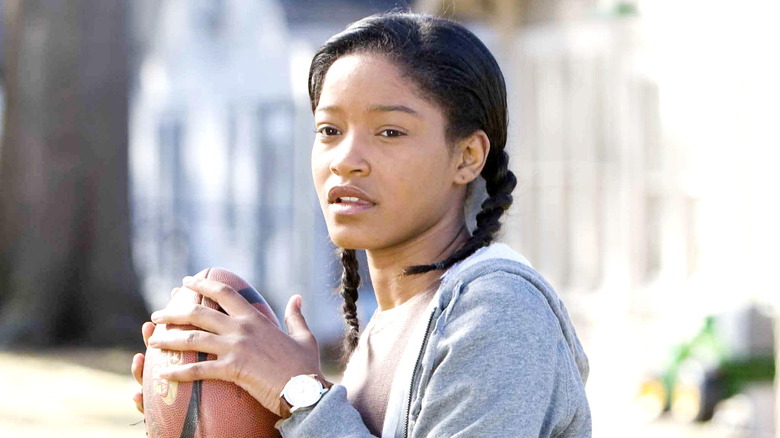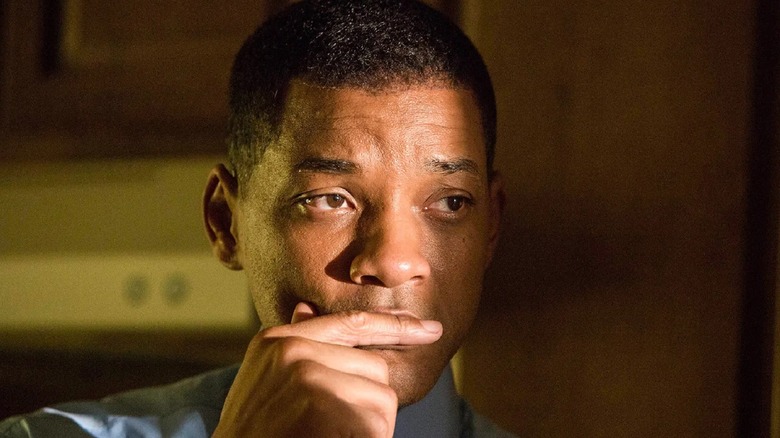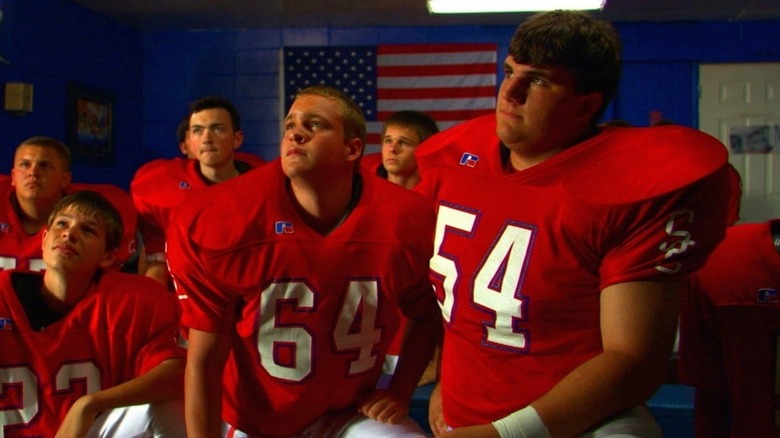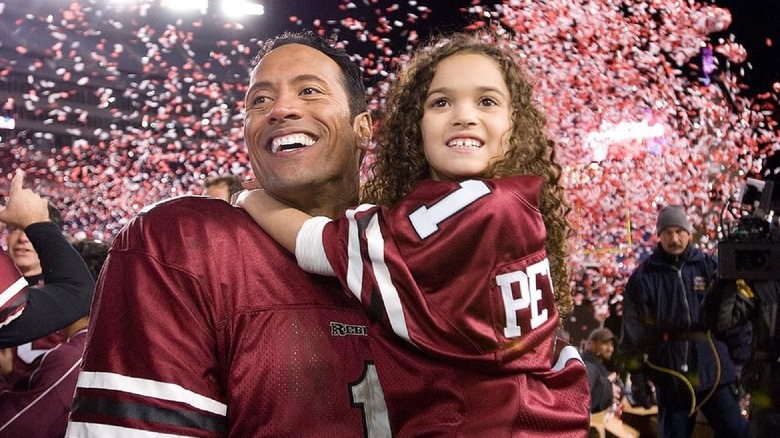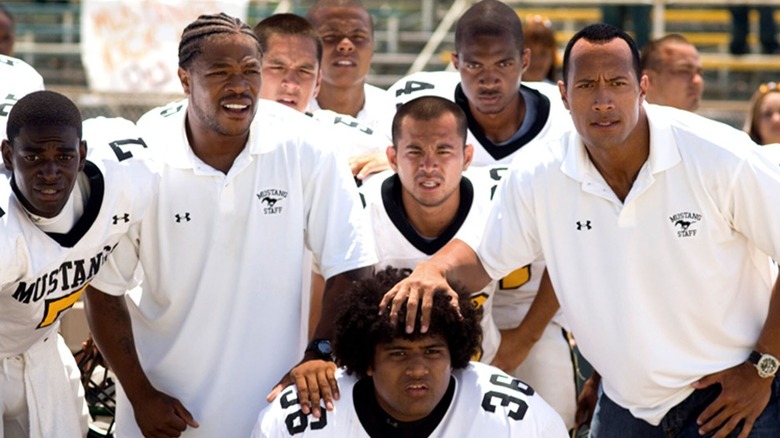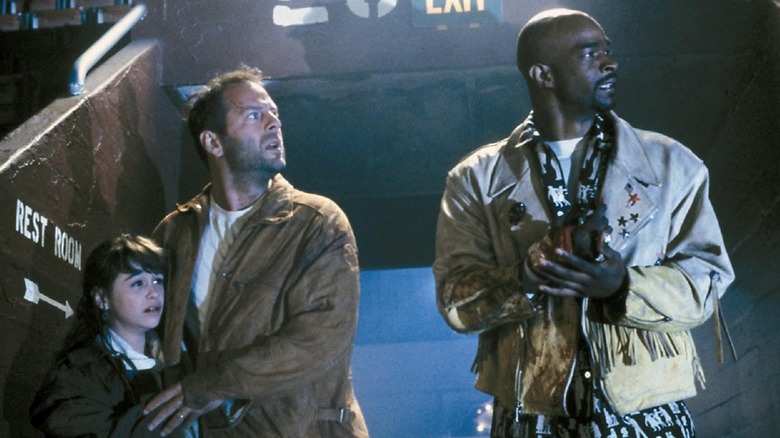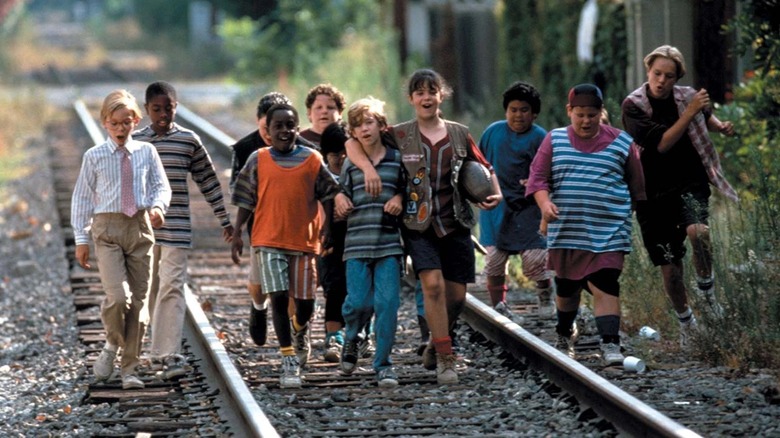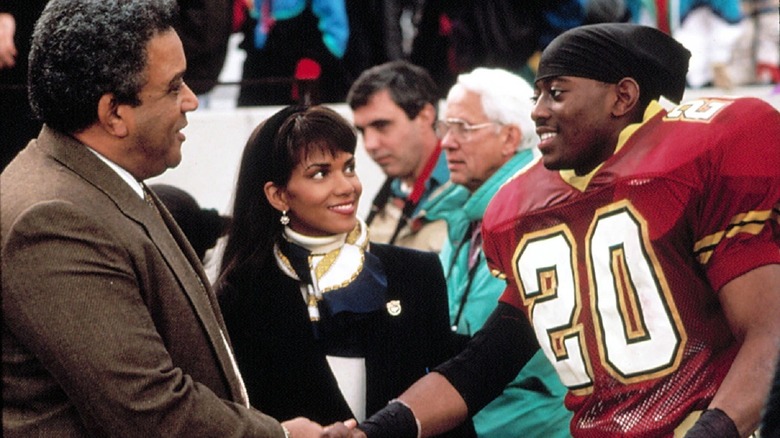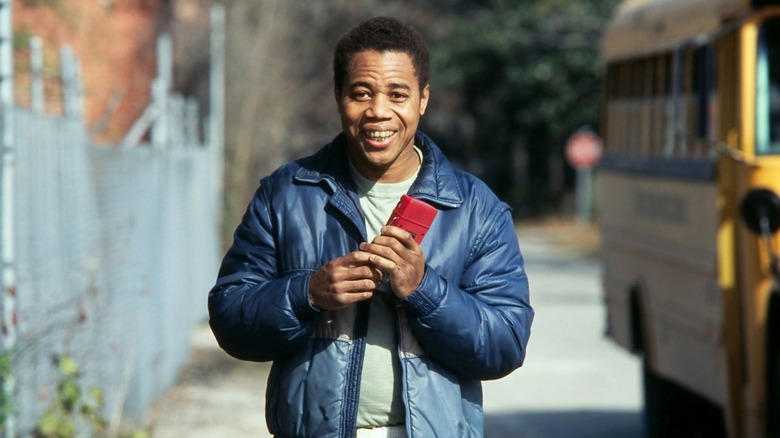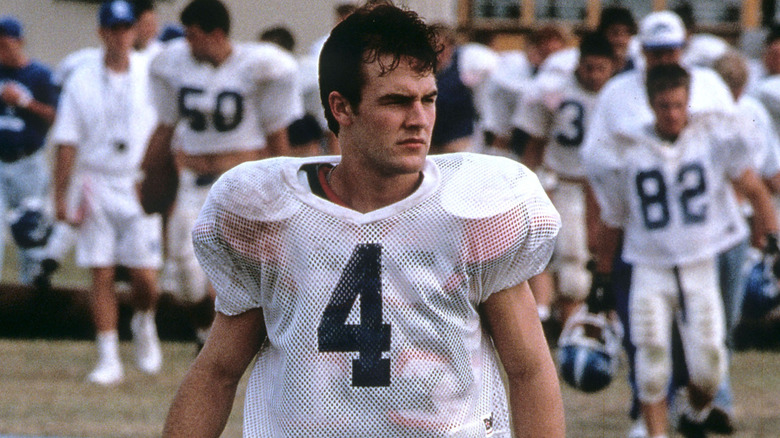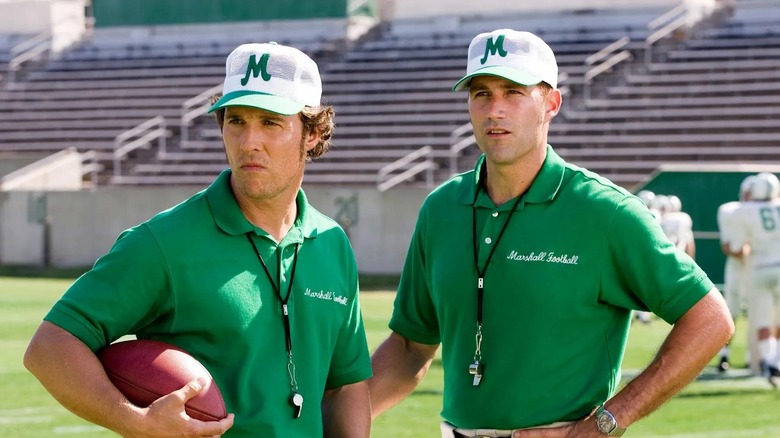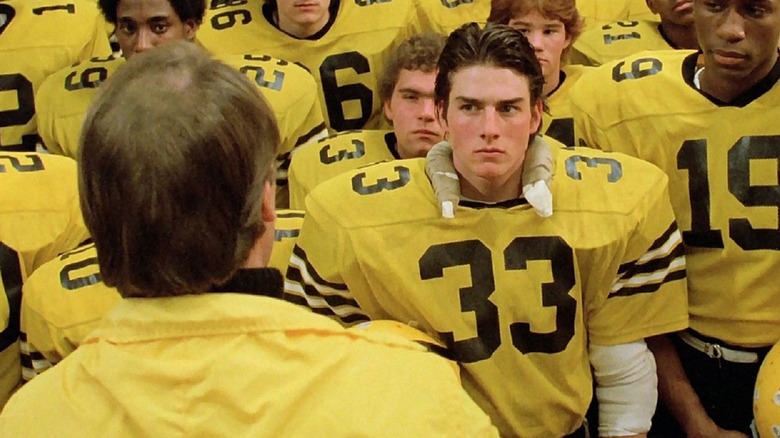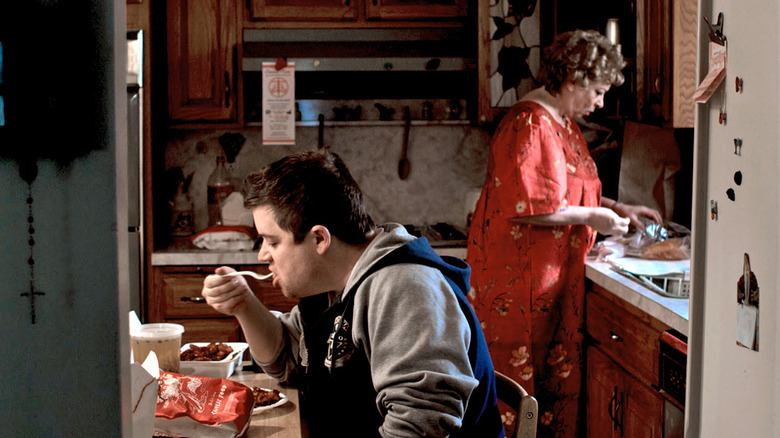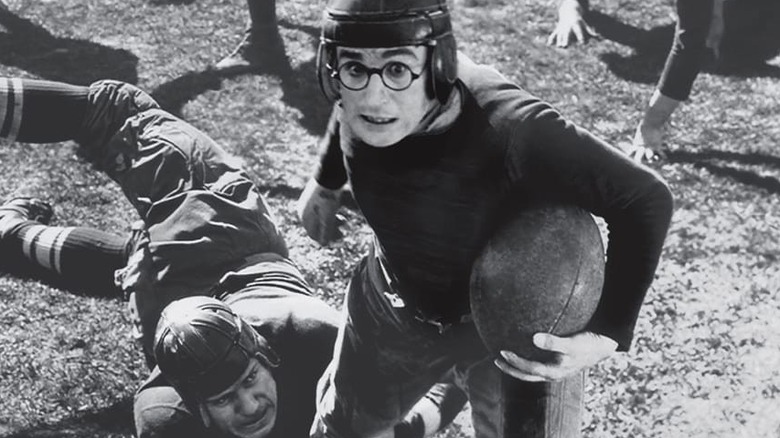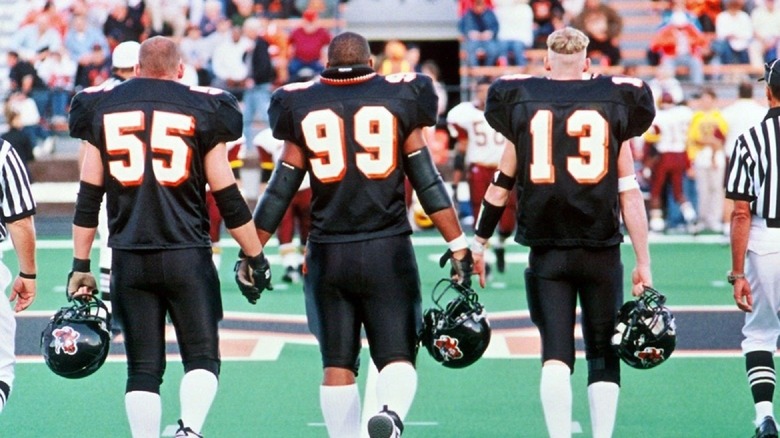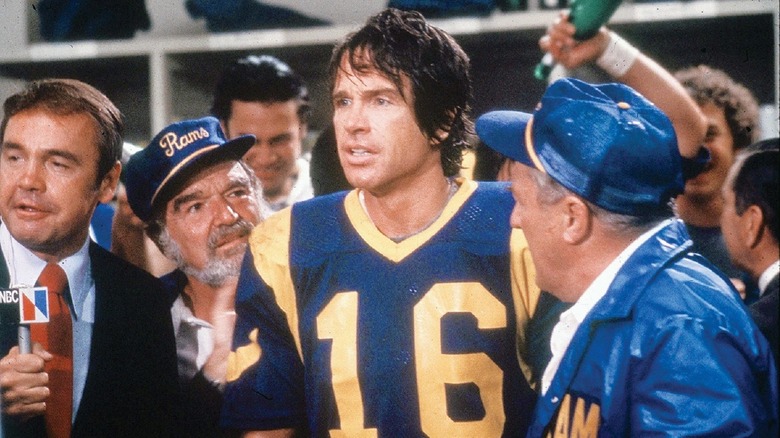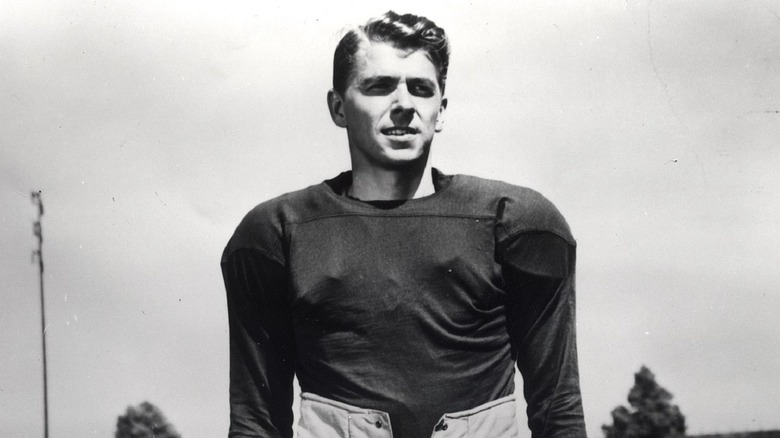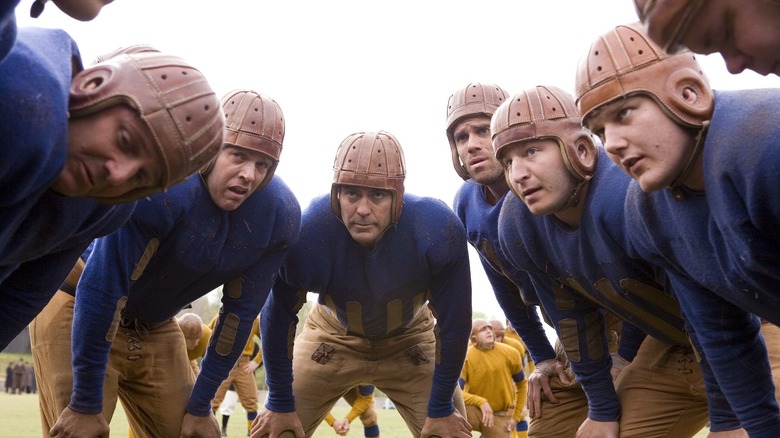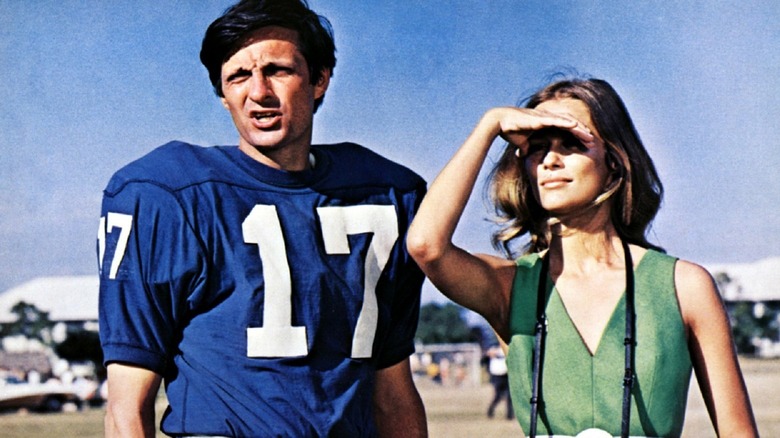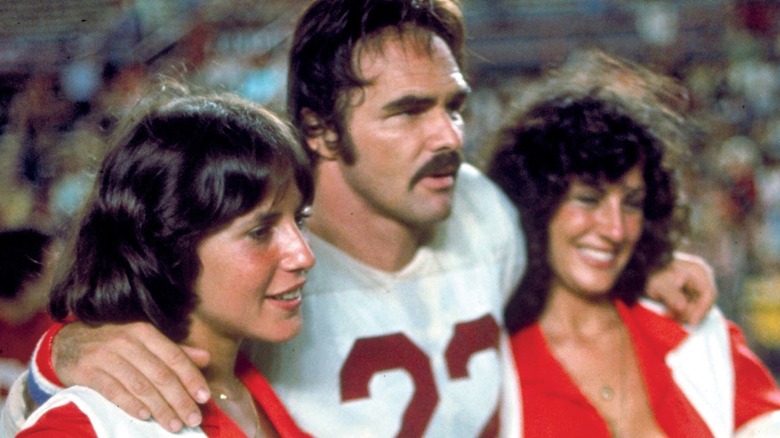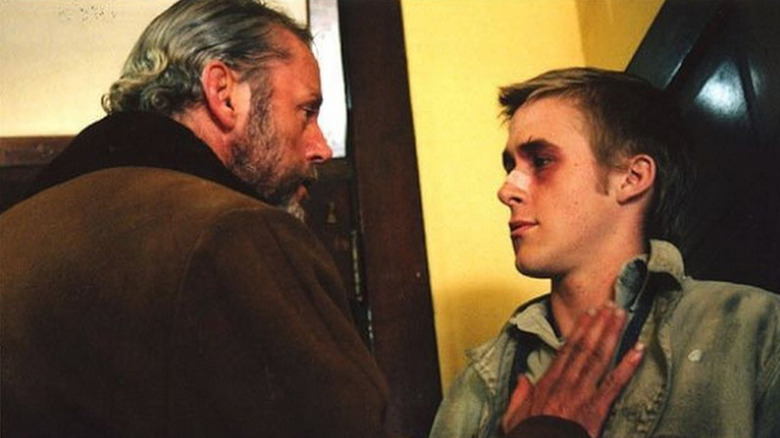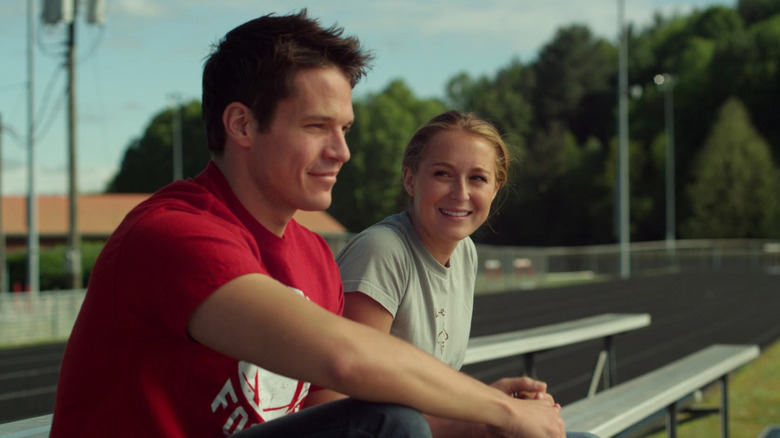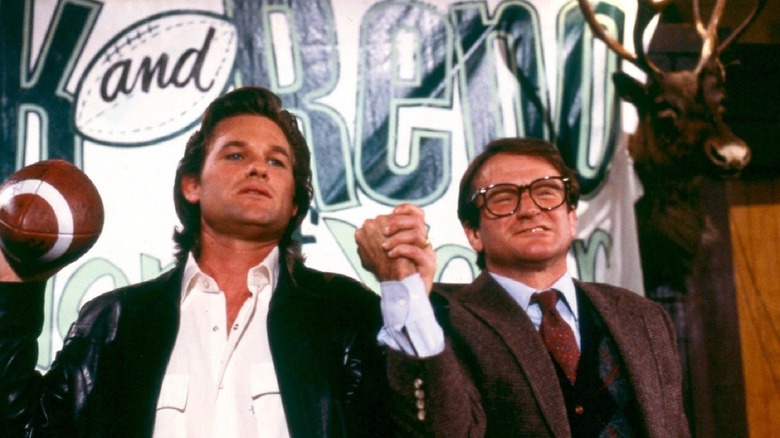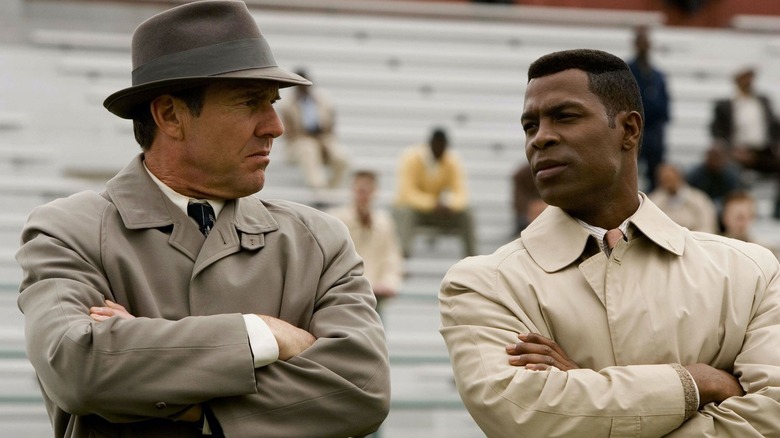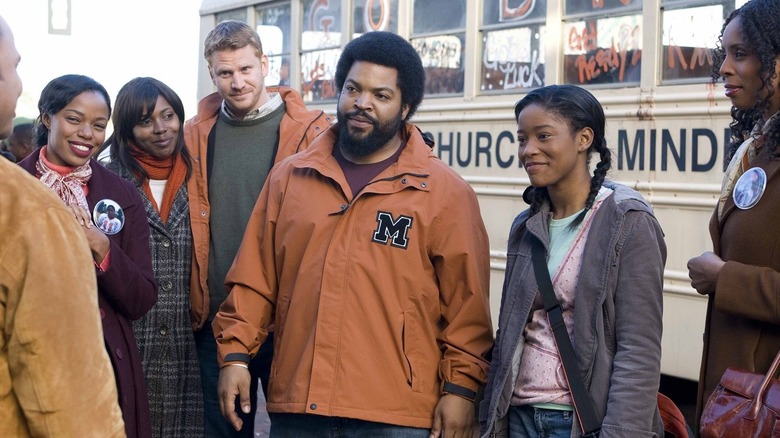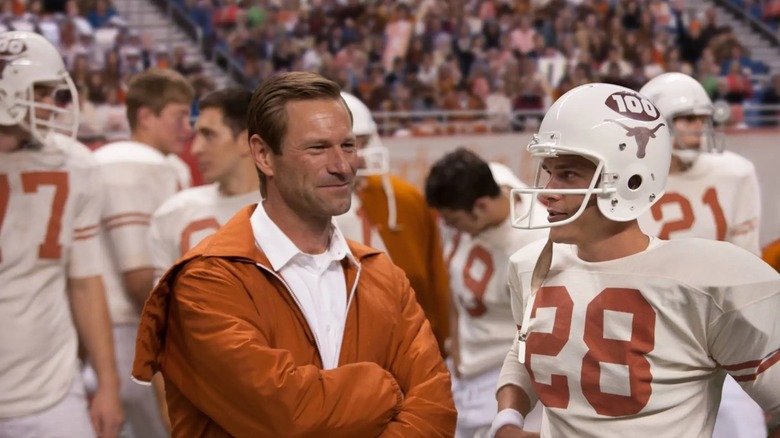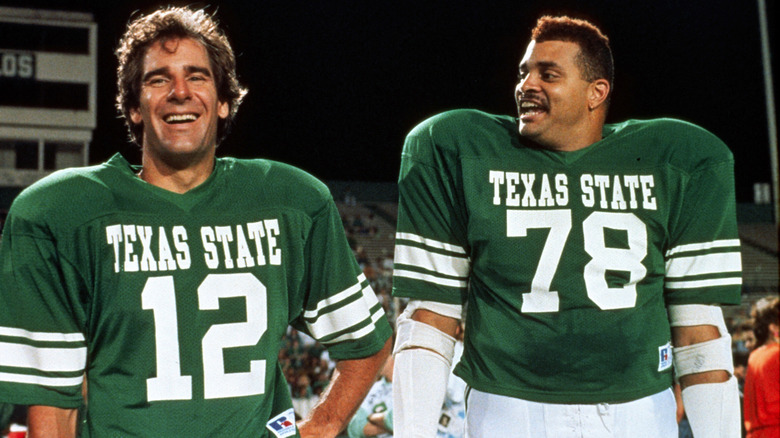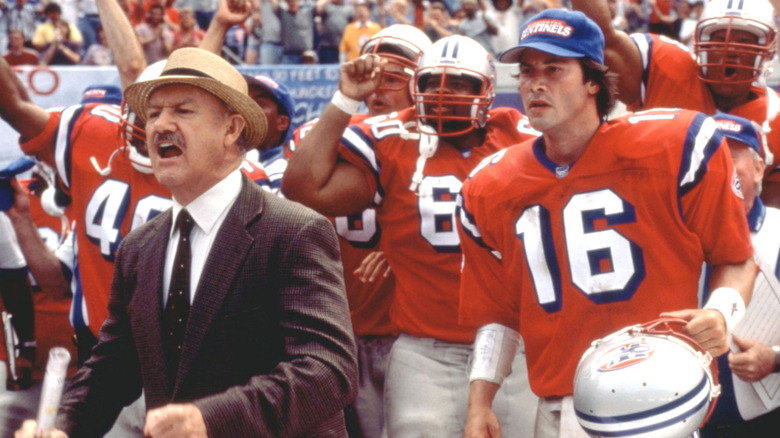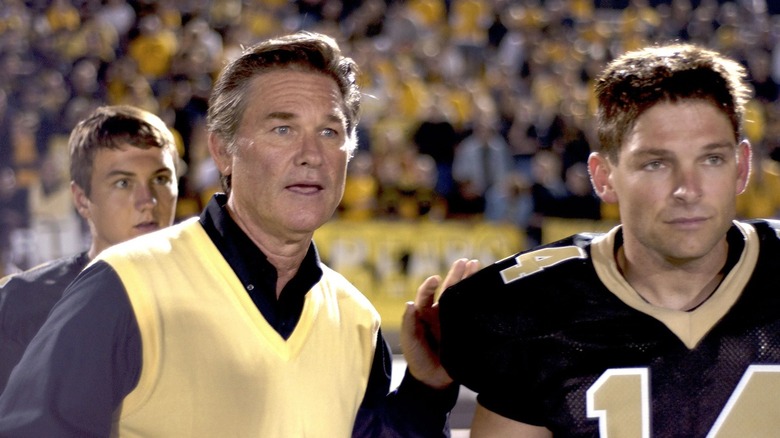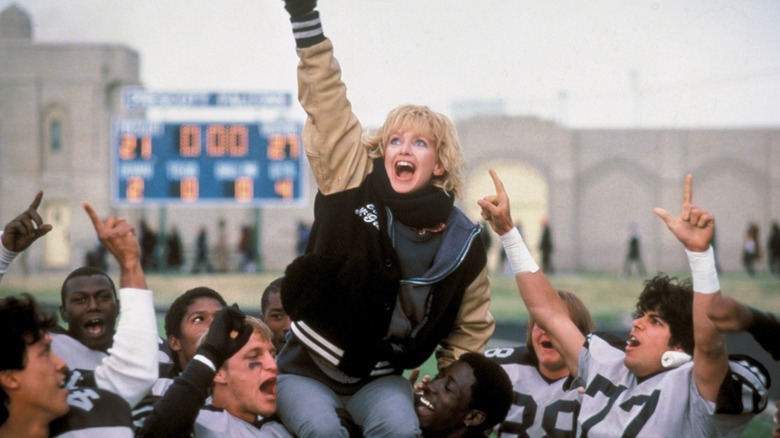30 Most Underrated Football Movies You Need To Watch
What makes a great football movie? Sports movies in particular have a special place in audiences' hearts, and successful movies about the ins and outs of American football, at every level, are no different. Like all sports movies, though, they usually have to hit a few specific narrative benchmarks for audiences to respond positively, while critics generally prefer films that aren't too formulaic or predictable. This obvious imbalance creates a big disconnect between what some people would consider a good movie and what others find unwatchable.
With this in mind, we looked at the ratings given to several football movies by both critics and audiences, as recorded on Rotten Tomatoes, and also took into account the movie's gross ticket sales — and net profits, where available – then used this data to determine 30 of the most underrated football movies that are worth a(nother) look.
1. Concussion (2015)
Bringing to light the real, devastating effects of CTE in football players and the prevalence of it arising from multiple head injuries over years of game play, "Concussion" is not a typical sports movie. Instead, it's a thoughtful look at the dangers of a violent game, and the responsibilities this multi-billion-dollar industry has to its players.
It only earned $13m back over its reported $35m budget, but that's fairly respectable for something this subdued that was deemed right away as Oscar bait. Ironically, it never got that elusive Oscar nomination, and despite being rewarded by the African American Film Critics Association with a trophy for Will Smith as best actor, the overall reception by critics was lukewarm, with a Rotten Tomatoes score of 58, a full 16 points (21.6%) lower than the audience score of 74. In his Los Angeles Times Review, Kenneth Turan called it "more ungainly than effective," while Jordan Hoffman at Mashable said it was "as subtle as a blow to the head," but everyone agreed Smith did a great job personally, and audiences responded to him and to the movie's grim findings.
2. Facing the Giants (2006)
"Facing the Giants" is an unapologetically evangelical movie about football, rather than being a movie about football (or anything) with characters who happen to be strong in their faith, and that small but crucial distinction can make it easy to underestimate it as a serious film. Movies of this type become boxed in by their own values in most cases and wind up almost literally preaching to the choir, as their proselytizing stories tend to draw strictly Christian audiences.
In fact, this is exactly one of the points of contention critics had with the film. Joe Leydon at Variety said "by preaching to the converted so heavy-handedly, the filmmakers fumble an opportunity to reach beyond their target demo of devout churchgoers." The film was also viewed as amateurish, with William Lobdell at the LA Times saying it felt like "an after-school special." This kind of reception culminates in a Rotten Tomatoes score of 16. Never underestimate the power of the movie-going public, though, because the film turned its $100,000 budget into $10 million at the box office, and an audience rating of 85.
3. The Game Plan (2007)
The biggest complaints about "The Game Plan" seem to be that it's formulaic, predictable, and the child star is too ... cute? Perhaps it had been too long since those critics had taken a kid to the movies, but those are the qualities kids respond to. Not that a child, at an individual level, can't appreciate a story with nuance, but kids in general are more comfortable with routine and expected outcomes. There's security in that subtle reinforcement. Kids will have the whole rest of their lives to be jaded and disappointed and faced with the ambiguity of unresolved endings — that's why they're so angsty throughout those teen years, to start. Let the younger ones enjoy some silliness.
Take the advice Monique (Roselyn Sanchez) gives to Joe (Dwayne 'The Rock' Johnson) for those coming teenage years: "The only thing you can do is make sure that she knows you love her, and that nothing's going to change that. And then when she's ready, she'll find you again." Put it all together and here was a movie dads could take their daughters to. A roaring $147 million at the box office — and a Rotten Tomatoes audience score of 69, compared to the critic score of 29 — says they did so, in spades.
4. Gridiron Gang (2006)
The barrage of pep talks in "Gridiron Gang" was likened by the Houston Chronicle to "hailstorms of Hallmark greeting cards." Meanwhile, the Austin Chronicle accused the film of "barrel[ing] toward you, stiff-armed." However, to critique a film as being trite or heavy-handed in its message when it's basically recreating a lot of real footage of a real man and his real speeches to his real players, seems like an exercise in contrarianism. And to complain that the epilogue indicates that the real life program upon which the film is based hasn't yet solved the problem of teenage gang violence and other criminality is far and away beyond the point.
Yes, the movie is rough around the edges, and The Rock hadn't quite honed his acting skills yet, but the film gets at least halfway where it wanted to be, and audiences overwhelmingly liked it, giving it a Rotten Tomatoes score of 81, a nearly 100% increase over the critics' score of 42. It might not be high art, but not everything has to be.
5. The Last Boy Scout (1991)
A self-aware action flick, "The Last Boy Scout" employs several tongue-in-cheek moments, making good use of the casual snarkiness of Bruce Willis and the studied comedy excellence of Damon Wayans. It's a serious story, as these things go, but it never fails to give the audience a wink and a nod as the plot marches on.
Critics disagreed to the extreme. One critic at The Washington Post accused it of only being about "rage and impotence," while another dubbed it "the filmic equivalent of a hate crime." The Miami Herald even pointed to "The Last Boy Scout" as "what's wrong with Hollywood." Despite all this negative press and a Rotten Tomatoes critical score of only 46, audiences had a more positive take, ranking it at 68 (a 47.8% increase) and earning a profit through domestic and international ticket sales. Considering how many times the film is being broadcast this month on Showtime alone, Willis and Wayans are probably still seeing residual checks today.
6. Little Giants (1994)
Slammed as unoriginal, "Little Giants" didn't fare well with critics, but audiences happily disagreed, giving the film a Rotten Tomatoes audience score of 63 against the critics' 36. Sure, the movie wasn't breaking down walls or innovating new storytelling devices, but it also gave its characters space to be more than just one thing.
The best example of this is in the narrative of Becky "Icebox" O'Shea, a fantastic football player with a killer instinct who nevertheless fails to make the pee-wee team her Heisman winning uncle coaches because she's a girl. And she's allowed to feel conflicted by that throughout the course of the story. She wants to play football, but she also misses the way her mom (now no longer in the picture) used to call her princess and make her feel beautiful. She thinks kissing and boys are gross on the one hand, but pretty fascinating on the other when regarding Junior, a new quarterback with a fantastic throwing arm as well as gorgeous blue eyes. She has never wanted to be a "girly girl," but she does want Junior to like her. That's where "Little Giants" shines, in letting these little kids tentatively cross bridges into maturity. Well, that and John Madden famously showing up in a tour bus and, with the help of his revered football star buddies, giving the kids some much needed confidence, plus a few pointers.
7. The Program (1993)
Exposing the foul underbelly of college football is the key aim of "The Program." This '90s movie, while dated now, gets inside the systemic way the big schools keep players under pressure to perform, to constantly be bigger and better and stronger. This system underplays the dangers of head injuries, it tacitly allows and even encourages PED use, and it keeps kids that are coming from extreme poverty and poor education beholden to the team as their only possible source of redemption and a positive future with VIP extravagances and the promise of big paydays in the future surrounding them.
Critics found the themes clichéd, with The Austin Chronicle's writer even going so far as to call it "flaccid, seasonal fare," but audiences were far more forgiving, appreciating its realism and rating it at 80% positive on Rotten Tomatoes. That's a drastic increase from the 43 rating that the movie received from critics.
8. Radio (2003)
The overwhelming critical response to "Radio," a post-"Jerry Maguire" Oscar-winning role for Cuba Gooding Jr. was quite negative. "Radio," which fell into the practice of neurotypical actors playing mentally disabled characters and the loss of dignity that can signify, as it often does, when accompanied by certain outsized stereotypical behaviors actors portray as part of their characterization. And further, with this movie in particular, critics panned the movie for its portrayal of Radio as something of a town pet.
But anyone who's ever watched a college football pregame show knows that schmaltz is a staple of the genre. Nearly every week during the season, there will be another story of a team (and maybe a town) that adopts a young fan with a terminal illness, a severe disability, or similar. These are the "feel good" stories of football — of all sports — and they're a big part of the lure, because fandom unites us. Besides, no one could watch the real Radio joining a cheer routine, at the end credits roll, and feel bad about that — hence the audience rating of 79, which is more than double the critics' rating of 35.
9. Varsity Blues (1999)
Almost an instant parody of itself the moment it was released, "Varsity Blues" is not a film to be taken seriously. Audiences understood this, giving it a positive Rotten Tomatoes rating of 76, $54 million in box office receipts, and another trip to theaters when a send up of it featured heavily in the trailer for "Not Another Teen Movie." Critics, bless their hearts, didn't get it. They rated it at 43, confused by its earnestness, put off by its clichés, or both.
There are definitely moments that the film plays for high drama -– or rather, plays out as an imitation of what high drama might look like -– but it's all part of the absolute wacky world that is West Nowhere High School, Texas. And the proof that it's making fun of itself, of its genre, of its very particular brand of teenage schmaltz, comes right at the start, with a big redneck named Billy Bob and his "dog," a giant pig named Bacon, squealing and stuffing their faces as Billy Bob drives his truck through dusty backroads picking up football players (complete with soaring hero music for Paul Walker, shot from below, as dreamy quarterback star Lance). It's a ridiculous tableau, meant to exemplify a ridiculous standard, a ridiculous existence, and a gloriously ridiculous film in the making. Cross your eyes and say it out loud: "I don't want. Your life."
10. We Are Marshall (2006)
"We Are Marshall," like a lot of football movies, is based on a true story. The true story of Marshall Football, however, is unlike that of any other. It was an unimaginable tragedy, the day an entire football team — and a lot of prominent citizens of small town Huntington, West Virginia -– died in a plane crash after a tough loss at East Carolina. It tore the city apart, but, more surprisingly, it brought it together like never before. That's a tough task for director McG to convey on the screen, but he did it with aplomb.
Not only did his music video experience help film the game scenes in a more visually comprehensive way than ever before, but his story really took time to focus on not just the team, but the town – the funerals, the survivor's guilt, the need to heal. The two are interlinked, more than probably any other in the country. They share a reverent, spiritual connection that can be felt by anyone who happens to come through the area on a gameday, particularly if that game day is November 14. They are Marshall. Audiences felt that connection, too, and gave the film a rating of 79. Critics, however, disagreed; USA Today coined it "exploitive," while Entertainment Weekly described it as "flat," with a critical consensus rating coming in at 49.
11. All the Right Moves (1983)
Sure, the big game –- the pivotal play, in fact -– that the story for "All the Right Moves" hinges on is patently ridiculous. Leading the game with 12 seconds left on the clock is no time to run a play, much less one that will require a handoff in the endzone. That's just dumb. The modern quarterback sneak was invented in 1940. Even if their opponents had all three time outs, they couldn't prevent the runoff of 12 seconds. Not that this is the reason audiences gave the film an undeservedly low rating of 39, but if you're a student of football it couldn't have helped.
Beyond that, however, is a capable coming of age film, with strong performances from Lea Thompson (as Stef's girlfriend Lisa) and a sparklingly young Cruise, that addresses the death of the Rust Belt, the glorification of sports above everything, and the unchecked power coaches can wield over their players. Critics, however, got the picture; Variety cheered on the film's "authenticity," while Roger Ebert called it "an astonishing breakthrough," leading to a solid Rotten Tomatoes rating of 63. Fair, given the play that the movie rests on.
12. Big Fan (2009)
People don't like to have a mirror held up to them, exposing their behaviors, their flaws, their weaknesses, and their hypocrisies. "Big Fan" is a movie that dwells in the obsession Paul (Patton Oswalt) has for his favorite sports team — and the unhealthy extremes it pushes him to. But fans don't want to think about that, they don't want to see their exuberance teetering on the edge of dysfunction. "That's not me," they think. "I would never do that."
They only came out for "Big Fan" to the tune of $234,540 at the box office. That's a huge loss of revenue, even against the film's modest $5 million budget. It didn't do so badly in the ratings, receiving a 62 from the audiences that did see it, and critics loved it, giving it an 86. Boston.com even called it "compulsively watchable." Unfortunately, money talks, and "Big Fan" was met with silence.
13. The Freshman (1925)
"The Freshman" is a classic film of the silent movie era -– and funnyman Harold Lloyd's most famous — which was a hit with critics. It was even a huge success in its day, bringing in over $2 million. Since the advent of technicolor, talkies, and eventually Rotten Tomatoes, though, while the critics' rating is a stellar 94, audiences are stuck at 78. It's still a good score, but the 16 point difference translates to 20% over the modern audience's assessment.
To be fair, most modern audiences probably had no idea this film existed up until now precisely because it's so old. A 2017 study found that only a third of millennials had seen a movie made in the 1960s or before, only 30% had watched a black and white film all the way through, and 20% consider all black and white films boring, regardless of genre. Additionally, many people simply look down on silent films or any movie they have to "read." They should make an exception here, of course. Harold Lloyd, a master of his art, is disarming and expressive and utterly enjoyable in this adorable little reel. It's impossible not to have a good time watching him.
14. Go Tigers!
"Go Tigers!" is a documentary film about the 1999 football season of Massillon, Ohio's Washington High School, and if you zoned out reading the first half of this sentence, you might already understand why audiences passed over it.
Before the age of streaming services, Americans were never all that interested in documentaries. Traditionally, these films were not given to dynamic storytelling, and often felt like lessons or work. "Go Tigers!" broke this mold, and critics lavished praise on it, with Joe Leydon of Variety calling it "a sharply deserved and richly detailed nonfiction feature that plays like feel-good, crowd-pleasing entertainment." On Rotten Tomatoes, it got an 87 rating from critics, which is significantly higher than the audience score of 68. While the audience score isn't bad, per se, the film only brought in $151,799 at the box office. (This low return could also be attributed to the film being released 10 days after the 9/11 attacks.) Whatever the reason for its poor initial offering, as the interest in documentary features steadily climbs, it might be a good opportunity to revisit this one.
15. Heaven Can Wait (1978)
Underrated primarily because it was never really considered a football movie, "Heaven Can Wait" scores a satisfactory 68 with audiences, but that rom-com fantasy distinction drastically changed when the Rams moved back to LA and made it into the playoffs.
In the movie, Warren Beatty plays LA Rams backup quarterback Joe Pendleton, who dies before his time and comes back as a businessman — a businessman who now speaks almost entirely in football analogies and works out to get himself a place on the Rams squad. It's the rare football film that actually uses real teams as part of the plot, so people have been excited every time life even starts to imitate art. It's also just a really good film on its merits. Critical consensus was outstanding, with an 87% fresh rating, nine Oscar nominations, and a win for art direction. As Frank Rich of Time Magazine put it, "Heaven Can Wait is nonstop -– and blissfully uncomplicated -– pleasure." And it's even about football.
16. Knute Rockne: All American (1940)
Being a black and white 1940 film about a legendary Notre Dame football star and coach, "Knute Rockne: All American" was apt to be revered by no one but critics and the late Regis Philbin. It's not a particularly meaty film, either, skipping along its timeline with alacrity until suddenly taking on the tone of deep foreboding just before the denouement. What it is, however, is an enjoyable early biopic of a deeply influential man in the American football landscape, defining the genre as actual game footage is intercut with closeups to add authenticity, and it's filled with amusing notes.
Rockne (Pat O'Brien) is almost comically gruff and stoic, even in reaction shots to big plays, his wife Bonnie (Gale Page) is the only one to consistently call him Knute, pronounced with a hard K as was the real Rockne's preference, and Ronald Reagan of all people shows up in the film's middle third as the small but crucial role of George Gipp (of the famous Gipper speech). Critics recognized the film's impact and quality, rating it at 88% fresh. However, audiences have a way to go to catch up to that regard, giving it just a rating of 60.
17. Leatherheads (2008)
Watching "Leatherheads" today, it's hard to tell why audiences were so unmoved by it. George Clooney's acting is reminiscent of his insouciant portrayal of Everett in "O Brother Where Art Thou," all glib lines out the side of his mouth and lopsided smiles the other way. Renee Zellweger is a gloriously mouthy broad, not unlike her Barbara in "Down With Love." And John Krasinski is all wide-eyed appreciation with just the right amount of arrogance.
The dialogue is quick and witty and the ending plays out almost like a caper. And yet the movie garners only 38% on Rotten Tomatoes and it lost $17 million at the box office. Critics were somewhat more appreciative, with a rating of 52, but reviews repeatedly praised Clooney's easy star quality and adeptness with screwball comedy, with USA Today saying it successfully achieves a tone of "smart-alecky, lightweight fun." Surely that's worth a second set of downs.
18. Paper Lion (1968)
"Paper Lion" is an odd duck. The story is based upon George Plimpton's nonfiction book chronicling his highly unsuccessful tryout with the Detroit Lions. It's also a football movie without a hero's arc or an underdog showing his mettle or a revelation about the many dark sides of the sport, so it is a hard sell to the average sports-fan-slash-movie-lover.
While critics love fresh takes on old subjects, fans flock to the familiar. They want the game to be decided by a last ditch throw to the end zone as time expires. They want everyone to give up before being drawn back in by the dedication of another. They want, perhaps more than anything else, to believe if they took the field, if they worked hard enough, they could be there too, helping their teams win. So despite a positive critical reception (Rotten Tomatoes features only two reviews, so no official rating, but with 3 out of 4 stars from Roger Ebert, a 75-79 range is a safe bet), audiences topped out at 45 on the Tomatometer.
19. Semi-Tough (1977)
To be sure, the overtly '70s attitudes of casual bigotry and sexism that pervade "Semi-Tough" can make it hard to watch today, but it might still have something to offer. The film is a satire, after all, and while that can be hard to achieve proper balance, some critics, like those at Time Out, said "Semi-Tough" is a capable send-up of the "American ideal of winning," as well as the incredibly trendy new wave self-improvement movement of the era. The New York Times called it "consistently witty" and "vulgar in intelligent ways," but did allow that the plot, such as it is, takes a while to develop.
Upon its release, "Semi-Tough" was something of hit — not as big a comedy as "Annie Hall," but bigger than "High Anxiety" – and those audiences may have given the film a rating more closely aligned with the critics' 83. As it stands, though, current audiences leave it at well less than half that with a mere 32.
20. The Slaughter Rule (2002)
Independent films ruled the '90s, but by the time the 21st century rolled around, the boom was over. So even though 2002's "The Slaughter Rule" was nominated for the Sundance Film Festival's grand jury prize, when it finally saw limited release in January of 2003, it only brought in a measly $13,411. Sequels and franchises were the order of the new millennium, with "Lord of the Rings: The Two Towers" and "Harry Potter and the Chamber of Secrets" bracketing the top 15, despite having come out six to 10 weeks prior.
However, critics exalted the film; The A.V. Club called "The Slaughter Rule" a "powerful meditation on masculinity," and Newsweek praised it for having a "willingness to take big emotional risks," which translated to a Rotten Tomatoes rating of 74. The film's sensitivity wasn't necessarily a selling point for moviegoers, though. Two years before he knocked everyone's socks off in "The Notebook," not even Ryan Gosling could save this for audiences, who landed on a terribly underrated score of 43.
21. 23 Blast (2014)
"23 Blast" could almost be termed a do-it-yourself movie. Screenwriter Toni Hoover is from the town, and apparently Googled how to complete a script after personally getting the go ahead from the film's subject Travis Freeman and his parents. The filmmaking itself, then, becomes an incredible story, and it can be easy to dismiss those, especially when the budgets are low, the acting is heavy-handed and/or robotic, and the visual aesthetic looks cheap and amateurish. That's not to say this movie is all those things, but it has its challenges.
Critics panned it; The Guardian chided it as being "hopelessly square," and Austin Chronicle likened it to a Hallmark movie, culminating in a Rotten Tomatoes of just 36. Where it undeniably succeeds, however, in the grand tradition of sports clichés everywhere, is not in its resumé but in its heart. "23 Blast" tells the true story of a varsity football player (Freeman, played by Mark Hapka) who develops an infection in both eyes, leading to irreversible blindness. It follows a familiar arc and hits upon well-worn tropes, but is pulled from the brink of intolerability by the charm of its star and his relationships with his two closest friends as they banter back and forth among them. Unfortunately, despite a relatively positive response from the audiences who saw it (garnering a 66 rating), it only pulled in $549,185 at the box office, failing to earn back even its rock bottom budget of $1 million. It deserved better than that.
22. The Best of Times (1986)
The citizens of Taft, California, where "The Best of Times" takes place, really hate the people of Bakersfield. For decades upon decades, Bakersfield has destroyed Taft in their annual football game, and the one time — the one time — Taft had a chance to win it all, Jack Dundee (Robin Williams) dropped the ball. He's been obsessing over it, ranting and raving about it, and trying to live it down ever since.
Herein lies the very nature of rivalry, down to its essence. The movie also explores that curious animal known as the male midlife crisis, in which the idea of a return to one's glory days is both tantalizing and terrifying, but The Washington Post simply classified the film as "a teen comedy populated by adults," while The New York Times said "the script keeps getting in its own way." The aggregate critic's score on Rotten Tomatoes comes in at 31. Audiences were similarly unmoved, giving it a 42 on Rotten Tomatoes and netting it a more than $4 million loss at the box office. Undeservedly. The movie isn't perfect, but it's a better time than that.
23. The Express (2008)
"The Express," a film about the short but historic football career of Ernie Davis, actually received both a fair critical response and a positive audience reception, resulting in Rotten Tomatoes ratings of 62 and 75, respectively. How, then, did it manage to lose $31 million at the box office? The racial slurs in the film are, admittedly, a lot to bear witness to, in a heavy-handed attempt to make racial justice one of the film's themes. But does that diminish the value of telling the story of the first black athlete to win the Heisman Trophy?
Roger Ebert said "The Express" was "involving and inspiring in the way a good movie about sports almost always is." Meanwhile, Time Out considered it to be a worthy subject in a genre "capable of absorbing any story and delivering the same uplift." Almost everyone who saw the movie liked it, and yet it bombed. With universally praised performances by Rob Brown (as Davis), Dennis Quaid (as Syracuse head coach Ben Schwartzwalder), and the feature film debut of Chadwick Boseman as Floyd Little, it just doesn't seem fair that this one got overlooked.
24. The Longshots (2008)
Like many in the long tradition of football movies, "The Longshots" is based on a true story. Starring the affable Ice Cube and a young Keke Palmer, it's a classic underdog tale with an added dash of girl power, but while it may be a typical Cinderella story, it was praised for its "quiet conviction," per Roger Ebert, and even reviewers who ultimately didn't like the film appreciated the sweet and believable family chemistry between the two stars.
The Toronto Star stated that the film didn't bring anything new to this "hackneyed" genre, which summed up most of the critics' thoughts, bringing their Rotten Tomatoes average to only 41%. It fared slightly better with audiences, coming in at 61, but cost twice as much money as it made. For a movie that had all the ingredients to have been a hit, it was a big disappointment.
25. My All-American (2015)
Perhaps the reason so many critics decry "My All-American" (like SF Gate calling it "predictably manipulative") is that filmmakers choose the same types of stories to tell over and over. In "My All-American," the story focuses on the true yet tragic story of Freddie Steinmark, a young man who, much in the mold of "Rudy," works and works and works himself to death to play college football, and in the mold of so many others, develops a mystery disease (in this case, cancer) and dies well before his time, leaving a legacy of the legendary.
Dubbed by Slant Magazine as "shamelessly corny but wholly sincere" and The Washington Post as substantive as a "highlight reel, not a movie," it's no wonder its critics' score on Rotten Tomatoes is 31. What's harder to understand is the much more encouraging ratings from audiences, rating it nearly 150% higher at 77, who nevertheless didn't translate that enthusiasm to ticket sales. Its $20 million budget was met with a mere $2 million in sales.
26. National Champions (2021)
Unsurprisingly, "National Champions" is a movie about a college team about to play for that elusive title when their star quarterback (played by Stephan James) throws a wrench in the plans. Critics were lukewarm on it, reflected in their respectable 65% Rotten Tomatoes rating, with outlets like The A.V. Club praising the "outstanding cast" but lamenting the thin characters they play.
Audience response was just as uneven, with a relatively high approval rating of 79 on Rotten Tomatoes, yet it grossed only $475,488 across nearly 1,200 theaters. Considering this was after most public gathering restrictions had been lifted around the U.S., not even the pandemic is a good enough excuse for such a poor showing. The film deals with the very relevant issues of college players' amateur status as student athletes, of sacrificing their bodies for football, and their inability to access ongoing medical care after leaving school for injuries sustained during their playing career. It feels current, and urgent. As Variety's Joe Leydon observed, "it's as timely as last night's episode of 'ESPN Sports Center,' and as riveting as a well-crafted tick-tock suspenser." A must-watch.
27. Necessary Roughness (1991)
"Necessary Roughness" doubled its money at the box office, banking on quintessential late '80s-early '90s stars like Scott Bakula, Sinbad, and Kathy Ireland, but critics and audiences alike panned the film for its content. Critics accused it of all manner of ills, including The Austin Chronicle labeling it "instantly forgettable," and the ratings on Rotten Tomatoes come together as a rating of 33% — a big splat.
Audiences were similarly underwhelmed, rating it at 47, completely missing the fact that the movie's light humor is exactly what it wants to be. It layers multiple redemption stories together with silliness and tender moments that all work in their own way. Like the Fighting Armadillos, the cast of "Necessary Roughness" adapts to a different standard. Instead of being forced into a box of either a rowdy comedy or a triumphant underdog tale, the movie chooses to be both, and pulls it off. That's a win!
28. The Replacements (2000)
Barely eking out a profit at the box office, "The Replacements" pointlessly flopped. Sure, the strike premise is flawed in execution and presented in a very biased, pro-billionaire-owner manner, which is just weird and off-putting, but the movie itself is funny. Keanu Reeves was coming off his "Matrix" high, and while he'd not yet been universally identified as one of the greatest human males ever, there was really no reason for audiences to sleep on him. But sleep on him they did, with a fair-to-middling audience score on Rotten Tomatoes of 66%.
Critics liked the movie even less, with CNN calling it "barely coherent," while Salon.com critic Allen Barra took the film to task –- not out of nowhere, but perhaps too earnestly for a film with a soundtrack made up almost entirely of "Jock Jams" — for its disrespectful attitude to the unions NFL players not only need, but moviemakers utilize as well. The negative reviews amount to a Tomato rating of 41%, but on a lazy weekend afternoon, it's a fun way to spend two hours.
29. Touchback (2011)
"Touchback" is two great movie archetypes coming together: the classic sporting victory and the alternate destiny timeline. It's got full-on "It's a Wonderful Life" meets "Peggy Sue Got Married" vibes. It stars the always flawless Melanie Lynskey as the loving wife to our troubled hero (Brian Presley). And since nearly all high school football stories seemingly need to take place in either Ohio or Texas, this one gets some gorgeous shots out of Ohio Stadium.
Okay, it's slow to get off the ground, but otherwise, how could it miss?? Well, a limited release and no marketing campaign to speak of really let the film down, only allowing it to pull in $204,232 at the box office, despite a fairly decent audience response of 63% on Rotten Tomatoes. Critics, shockingly, were not impressed with the film, with The A.V. Club accusing it of tending to "lose track" of itself and "play it safe" with retread material, and the film's critical aggregate score comes out to a disappointing 38%. The beauty of alternate timelines, though, is that you can see things completely differently the next time through.
30. Wildcats (1986)
The feature film debuts of both Wesley Snipes and Woody Harrelson — a charismatic duo that would go on to bring us the classic gem "White Men Can't Jump" and the less classic, non-gem "Money Train" — "Wildcats" should be on every niche-buddy-movie completist's list of must-sees. That's totally a thing.
Granted, "Wildcats" has all the racial sensitivity one might expect from a raunchy '80s comedy, but the movie actually does try to make some statements about sexism -– at work, at home, and everywhere in between –- that women weather constantly. (It's cis-het White feminism, of course, and it's not perfect by a longshot, but it makes a few little steps forward, and in football, where it's often a game of inches, every little step counts.) Unfortunately, it was generally dismissed by critics and audiences alike, rating on Rotten Tomatoes at 26 and 49, respectively, with Roger Ebert calling it "worn out" and comparing it unfavorably to star Goldie Hawn's earlier work. Fair point, perhaps, but never in "Private Benjamin" did she ever cuss someone out, then follow it up with an argument that it was "linguistically correct," nor did that movie have sassy cheerleaders. Case closed.
